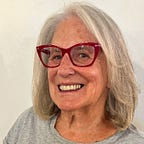You Are Your Own Best Doctor
I’m a big believer in taking personal responsibility for one’s health. I feel as though what I’ve been doing for the past 45 years (researching diet and exercise, quitting smoking, and making health and wellness my “hobby”) is yielding a big payoff for me right now.
And it is no longer as difficult to do as it used to be, since we can have all the sensors we want in our pockets or on our bodies all the time.
As you may already know, I was an early adopter of the “quantified self” movement. I have a first generation Withings connected blood pressure monitor, and a body composition scale. I also drove myself and those who know me crazy by buying and wearing about half a dozen fitness trackers before coming to the conclusion that they were all alike. I went through a year of answering queries on which one was best.
Fortunately, by that time the Apple Watch was released, and I can now track my heart rate, steps, stand up and sit down activities, and general movement in one place.
However, the Watch doesn’t track sleep, so I’m still wearing the Misfit Shine, which thinks that if I don’t move, I’m asleep. Pretty primitive, but better than nothing, right?
Because of my friendship with Atmotube, I also have a first generation air quality monitor so I can check the toxicity of the air both inside and outside the house.
And last week, I decided to spring for AliveCor’s new FDA approved portable EKG attachment to the iPhone. I just put my fingers on the device and in a minute, it had given me a reading that I had no irregularities on my EKG. Actually, this device is marketed to people who have atrial fibrillation, a common heart arrhythmia that can cause stroke. But it’s a good way to send something quickly to your physician if you suspect something else is wrong, too.
I no longer outsource my health to the doctors, because over a lifetime of studying health care and medicine as a hobby, I think they don’t know much more than I either already know or can find out in a hurry. Back in the day, when medical information was mediated by the physician, it made sense to trust the doctor. But two things have changed:
1)the internet (and I don’t mean just Google, because if you have a health condition chances are there is a support group, and industry group, or a forum for it, where people share experiences);
2)the increasing doctor shortage and the number of patients each doctor must see a day in order to cover her “nut.” This means most doctors are drowning in either patients or paperwork, and don’t really have time to keep up by going to all the continuing education programs they used to. They also can’t filter through the mountain of information on every condition affecting every patient in a medical practice.
So it’s logical that if you have a condition and you’re concerned about it, you have spent more time researching it than your doctor has, even if she’s well-intentioned and tries to keep up.
And then there’s something that hasn’t changed, but that has become much more important: nobody knows your body the way you do. Doctors visit your body; you live in it. This has been known at least since the dawn of the Eastern religions, in which most practices begin with a body scan.
If you think Obamacare, or Trumpcare, or whatever, can substitute for your own self-knowledge and self-care, you are doomed to learn a very important lesson some time in the future.
